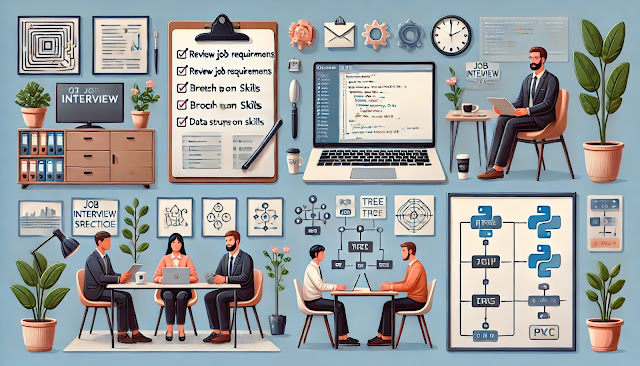How to Prepare for a Software Development Interview
Preparing for a software development interview can feel
daunting, but with the right strategies and mindset, you can confidently
showcase your skills and land the job. Here’s a step-by-step guide to help you
ace your next software development interview:
1. Understand the Job Requirements
Before diving into technical preparation, thoroughly review
the job description to understand the specific skills and technologies the
company is seeking. Make a list of the required programming languages,
frameworks, and tools. For example, if the role is focused on backend
development, brushing up on databases, APIs, and server-side programming will
be essential.
2. Brush Up on Data Structures & Algorithms
Data structures and algorithms form the core of most
technical interviews. Familiarize yourself with:
- Arrays,
linked lists, stacks, and queues
- Trees
(binary trees, AVL, and B-trees)
- Sorting
algorithms (quick sort, merge sort, bubble sort)
- Graph
algorithms (BFS, DFS, Dijkstra's algorithm)
- Dynamic
programming and recursion techniques
Practice Resources:
- LeetCode
and HackerRank are excellent platforms to practice common interview
questions.
- Cracking
the Coding Interview is a great book for in-depth explanations of
coding problems.
3. Master Your Chosen Programming Language
Although you’ll need to know multiple programming languages
for most roles, interviewers typically allow you to choose the language you’re
most comfortable with. Whether it’s Python, Java, C++, or JavaScript, ensure
you're familiar with:
- Syntax
and language-specific quirks
- Standard
libraries
- Best
practices for performance optimization
- Object-oriented
programming principles and design patterns
4. System Design and Architecture
For senior roles, system design interviews are a key
component. These interviews assess how well you can design scalable, efficient
systems. Focus on:
- Building
large-scale distributed systems
- Designing
databases (SQL and NoSQL)
- API
design and microservices architecture
- Load
balancing, caching, and replication techniques
Prepare by studying:
- Designing
Data-Intensive Applications by Martin Kleppmann
- Blogs
and case studies on scalable systems like Twitter, Facebook, and
Google.
5. Prepare for Behavioral Questions
Behavioral questions help interviewers assess how you
approach problem-solving, teamwork, and project management. Be ready to answer
questions like:
- "Tell
me about a time you faced a challenging bug and how you resolved it."
- "How
do you handle tight deadlines?"
- "Describe
a project where you had to collaborate with a difficult team member."
Use the STAR (Situation, Task, Action, Result) method
to structure your responses, focusing on how you contributed to solving the
problem.
6. Work on Problem-Solving Speed
Time management is crucial in technical interviews.
Interviewers often give you a limited time to solve coding problems. Improve
your speed by:
- Solving
problems under time constraints
- Breaking
down complex problems into smaller, manageable steps
- Prioritizing
clarity and correctness in your code
7. Familiarize Yourself with Version Control and
Collaboration Tools
Most companies use Git for version control and
collaboration. Be sure you’re comfortable with:
- Git
commands (commit, push, pull, branching)
- Code
reviews and collaboration using platforms like GitHub or GitLab
- Working
with CI/CD pipelines, if applicable
8. Understand the Company’s Tech Stack
Tailor your preparation to the technologies used by the
company. For example:
- If
the company uses React or Angular, brush up on front-end
frameworks and best practices.
- For
a company focusing on AWS, learn cloud architecture, deployment
strategies, and services like EC2, S3, and Lambda.
- If
it’s a startup, demonstrate your versatility across a broad range of tools
and languages.
9. Mock Interviews
Mock interviews simulate the real interview environment and
are a great way to reduce nervousness. Try:
- Coding
with a friend or colleague under timed conditions.
- Platforms
like Pramp or Interviewing.io for free mock interviews.
- Analyzing
your performance to identify areas for improvement.
10. Prepare Questions for the Interviewer
Interviewers appreciate candidates who ask thoughtful
questions. You can ask about:
- The
company’s approach to software development (Agile, DevOps, etc.)
- How
the team handles code reviews and continuous integration
- Career
growth opportunities and the company’s technical roadmap
Conclusion:
Acing a software development interview requires a balanced approach of technical proficiency, problem-solving skills, and effective communication. By following this guide and practicing regularly, you can significantly increase your chances of success and land your dream job.







0 Comments